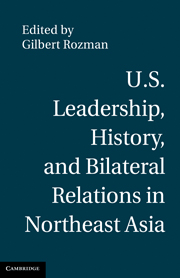Book contents
- Frontmatter
- Contents
- List of Contributors
- Acknowledgments
- U.S. Leadership, History, and Bilateral Relations in Northeast Asia
- Introduction
- PART I HISTORICAL MEMORIES AND BILATERAL TIES WITH ALLIES
- PART II HISTORICAL MEMORIES, JAPANESE–SOUTH KOREAN RELATIONS, AND U.S. VALUES
- 4 Japan–South Korea Relations and the Role of the United States on History
- 5 Getting Away or Getting In?
- 6 U.S. Strategic Thinking on the Japanese–South Korean Historical Dispute
- PART III HISTORICAL MEMORIES, SINO–SOUTH KOREAN RELATIONS, AND U.S. VALUES
- Index
4 - Japan–South Korea Relations and the Role of the United States on History
from PART II - HISTORICAL MEMORIES, JAPANESE–SOUTH KOREAN RELATIONS, AND U.S. VALUES
Published online by Cambridge University Press: 01 March 2011
- Frontmatter
- Contents
- List of Contributors
- Acknowledgments
- U.S. Leadership, History, and Bilateral Relations in Northeast Asia
- Introduction
- PART I HISTORICAL MEMORIES AND BILATERAL TIES WITH ALLIES
- PART II HISTORICAL MEMORIES, JAPANESE–SOUTH KOREAN RELATIONS, AND U.S. VALUES
- 4 Japan–South Korea Relations and the Role of the United States on History
- 5 Getting Away or Getting In?
- 6 U.S. Strategic Thinking on the Japanese–South Korean Historical Dispute
- PART III HISTORICAL MEMORIES, SINO–SOUTH KOREAN RELATIONS, AND U.S. VALUES
- Index
Summary
“I consider that there were clearly things which Japan overdid during the colonial period. I think that the Japanese people should know about them, remember them, and then maintain a feeling of remorse.” This was the author's position, which he actively communicated to interlocutors with whom he had the opportunity to talk during his four-month stay in South Korea from September to December 2007. But based on his research and conversations, the historical memory issue is far more complicated than this simple position suggests. Fundamentally, from the point of view of geopolitics and liberal values, Japan and South Korea have so many factors in common, and hence have structural reasons for cooperation, but historical memory drives them far apart. This reality is even negatively influencing cooperation on security (based on common geopolitical interests), values (democracy), and economic integration. This chapter first analyzes the intricate relations among geopolitics, values, and historical identity in Japan–South Korea relations; then it assesses how the rift on historical memory is perceived from the U.S. point of view. Finally, in search of a new strategy, the chapter highlights three distinct approaches open to a U.S. administration: the traditional approach of keeping its distance; the oft-considered but rarely tried approach of taking a judge-mediator position; and an unprecedented integrated approach treating the United States as an integral part of Northeast Asia's history. It concludes by evaluating how Barack Obama is positioning his administration in the face of changes under way in Japan and the Korean peninsula.
- Type
- Chapter
- Information
- Publisher: Cambridge University PressPrint publication year: 2010

